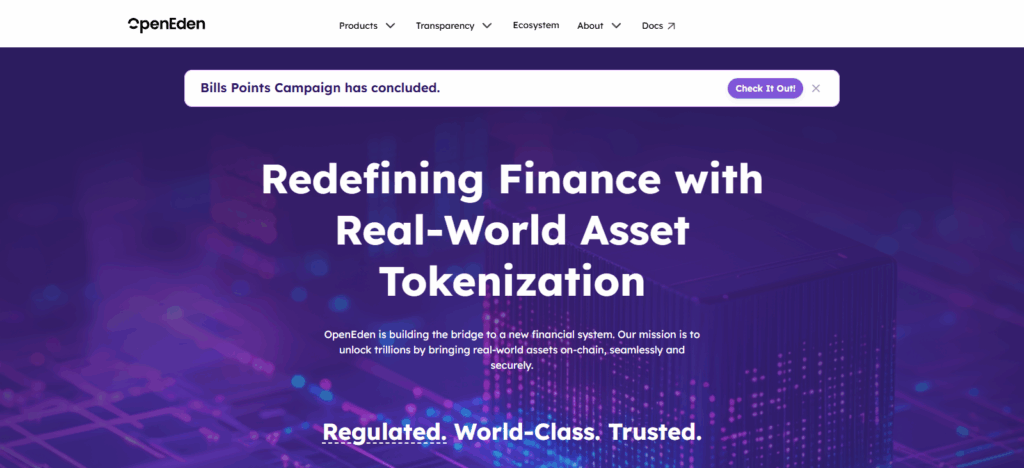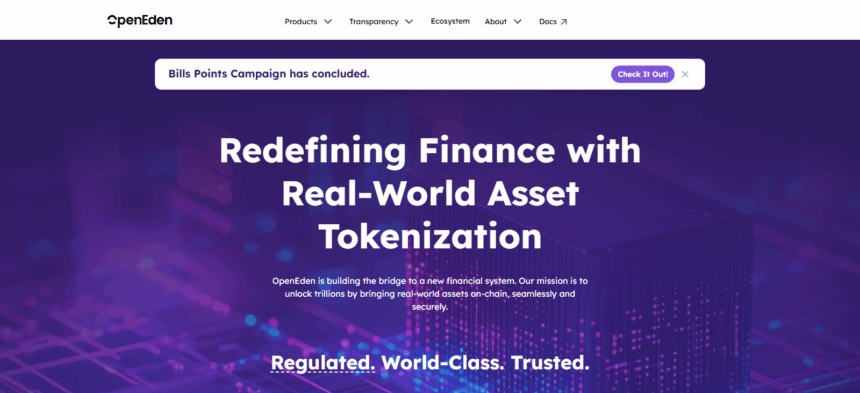In this article, I will discuss what OpenEden (EDEN) is—a pioneering DeFi platform that integrates traditional finance with blockchain.
OpenEden offers investors on-chain access to U.S. Treasury bills—real world yield-bearing assets—providing fully compliant returns that are also secure, transparent, and sustainable within the ever-evolving DeFi landscape and with full decentralization.
What is OpenEden (EDEN)?
OpenEden (EDEN) is a decentralized finance (DeFi) platform that merges traditional finance with blockchain technology by allowing on-chain access to yield-generating assets. To offer crypto investors safe, transparent, and compliant access to institutional-grade investments like U.S. Treasury bills, OpenEden tokenizes real-world assets (RWAs).
This approach enables users to earn stable yields while preserving on-chain certainty and transparency, making OpenEden a rarity in the market. It allows both retail and institutional investors to access a savings alternative to traditional finance and DeFi lending, with stable and predictable returns that are limited in risk.

The EDEN token is the backbone of the ecosystem, providing governance, staking, and reward functions. Governance token holders get to vote and shape the protocol via upgrades on yields, yield governance, and other discretionary aspects of the governance model.
OpenEden is compliant with institutional and regulatory standards and in the DeFi space is committed to catering to institutional clientele and the general crypto audience.
OpenEden integrates the features of traditional finance with the characteristics of decentralized tech on the blockchain. This is the beginning of the incorporation of tokenized real-world yields into the decentralized finance (DeFi) ecosystem.
How to Get Started with OpenEden
Step-by-Step Guide to Get Started with OpenEden
1. Select A Crypto Exchange
Choose a platform that supports OpenEden (EDEN), such as:
- KuCoin
- Binance
- CoinEx
- Gate.io
- MEXC
It is wise to compare fees, currencies, and security features.
2. Create and Verify Your Account
- Register with your email or phone.
- Complete KYC if required.
- Enable 2FA for added account security.
3. Fund Your Account
- Add fiat (USD, EUR, INR, etc.) bank or card payment.
- You can also crypto deposits such as USDT or ETH.
4. Find the EDEN Token
- Use the search bar and type “OpenEden” or “EDEN.”
- Confirm the trading pair (EDEN/USDT for example).
5. Finalize Your Purchase
- Decide whether to submit a market order (purchase instantly) or a limit order (determine your price).
- Approve the order.
6. Safeguard Your EDEN as Required
- Employ a protected wallet:
- Hardware wallets (Ledger, Trezor)
- Software wallets (Trust Wallet, MetaMask)
- Do not keep significant funds on exchanges.
7. Assess Performance and Yield
- Evaluate EDEN balances and yield from the exchange or wallet interface.
- Review OpenEden’s total yield and updates on their services.
How Does OpenEden Work?
Tokenization of Real-World Assets (RWAs)
- OpenEden tokenizes yield-bearing real-world financial assets, like Treasury bills, and creates blockchain instances representing them.
- These tokens represent participation in the underlying real-world assets and are transparent and traceable.
Smart Contract Integration
- OpenEden’s platform relies on blockchain technology to deploy automated smart contracts for managing, tracking, and reporting on assets and yields.
- By excluding intermediaries, users are assured direct, instant, and error-free access to their assets.
Yield Generation
- The financial assets generating tokenized real yields, like returns from treasury bills, for the holders.
- Token holders receive on-chain yield distributions, meaning their returns are real.
Secure and Compliant Infrastructure
- OpenEden assures compliance and regulatory frameworks are in place to guarantee the legal tokenization of assets.
- Depending on the jurisdiction and the investor profile, OpenEden does require KYC/AML procedures.
User Access via DeFi Interface
- Access to the platform for token purchasing and staking offers an uncomplicated DeFi experience, allowing users to connect their crypto wallets.
Benefits of Using OpenEden
Access to Real-World Yields
- OpenEden lets crypto investors earn predictable income, such as U.S. Treasury bills, within the DeFi ecosystem.
Enhanced Transparency
- OpenEden uses the blockchain to track and publicly share every transaction, every asset, and every yield, meaning no one can hide any manipulations.
Institutional-Grade Security
- OpenEden uses cutting-edge smart contracts, audited external custody of assets, and regulated asset custody to keep your funds secure.
Regulatory Compliance
- OpenEden is compliant with international frameworks in the DeFi space, making our platform more secure and legitimate to retail and institutional clients.
Decentralized Governance
- Holders of the EDEN token can vote on the governance of various platform parameters, such as ecosystem expansion, yield models, and policy frameworks.
High Liquidity and Flexibility
- Unlike other DeFi systems, OpenEden provides the efficient liquidity of DeFi systems coupled with the flexible traditional market liquidity of OpenEden tokenized assets.
Lower Entry Barriers
- OpenEden tokenizes traditional assets to reach historically inaccessible high-yield investments to anyone, regardless of the crypto wallet balance.
OpenEden vs Traditional Investment Platforms
| Feature | OpenEden (DeFi Platform) | Traditional Investment Platforms |
|---|---|---|
| Asset Type | Tokenized real-world assets (e.g., Treasury bills, RWAs) | Physical or paper-based assets managed by intermediaries |
| Accessibility | Global access with just a crypto wallet | Often restricted by region, regulation, or minimum investment limits |
| Transparency | Fully transparent via blockchain smart contracts | Limited transparency; investors rely on third-party reports |
| Intermediaries | No intermediaries — transactions are automated via smart contracts | Requires banks, brokers, or fund managers |
| Liquidity | High — tokenized assets can be traded 24/7 on DeFi platforms | Limited — often subject to market hours or redemption delays |
| Fees | Lower transaction and management fees | Higher fees due to intermediaries and operational costs |
| Yield Source | On-chain representation of real-world yields (e.g., T-bills) | Traditional interest, dividends, or market returns |
| Security | Smart contract-based with blockchain verification | Centralized custody; risk of mismanagement or fraud |
| Regulatory Compliance | Designed for DeFi with integrated KYC/AML compliance | Fully regulated under traditional financial authorities |
| Governance | Community-driven through EDEN token voting | Centralized decisions by company or fund managers |
| Minimum Investment | Very low — fractional ownership through tokens | Often high — fixed investment minimums apply |
| Transaction Speed | Near-instant blockchain settlements | Slower — depends on banking and institutional processes |
Key Features of OpenEden
Tokenization of Real-World Assets (RWAs)
OpenEden transforms U.S. Treasury bills and other traditional financial instruments into blockchain-based tokens and allows users to access on-chain real-world yields.
Transparent Yield Generation
Every blockchain transaction relating to yield generation is traceable, accountable, and free of fake intermediaries to mask performance.
Decentralized Governance
Every holder of the EDEN token participates in ecosystem governance, offering them the right to propose changes and vote on protocol upgrades.
Regulatory Compliance
OpenEden encompasses automated KYC and AML integrated systems, worldwide financial compliance, and the global regulation of the offering.
Smart Contract Automation
Automated systems significantly reduce human error by controlling all aspects of user transactions, yield distribution, and asset management.
Institutional-Grade Security
Extensive compliance policies, smart contracts, and secure custody protocols are in place to shield investors’ money.
High Liquidity
Unlike traditional markets, tokenized assets offer flexibility and liquidity on automated markets, as they can be redeemed, traded, and redeemed 24-7.
User-Friendly Interface
OpenEden’s intuitive UI allows users to seamlessly access portfolio and yield performance, as well as all of their invested assets, from one dashboard.
Multi-Chain Support
- Designed to function on different blockchains, the protocol improves user inter-operability and access.
Sustainable Yield Model
- OpenEden provides yield sustainability and consistency because, unlike most speculative DeFi, it is backed by real-world financial instruments.
Risks and Limitations
Regulatory Uncertainty
- OpenEden has to deal with tokenized real-world assets. Unpredictable governmental regulations and vague policies surrounding DeFi will affect operations and investor access.
Smart Contract Vulnerabilities
- Smart contracts are audited, yet, they may contain undiscovered bugs and weaknesses. Hackers having access to such glitches may exploit them and cause high financial damage.
Market and Interest Rate Fluctuations
- Interest rate changes and macroeconomic conditions will directly affect the value of tokenized assets and yields, thus reducing expected returns.
Liquidity Risks
- Rapidly changing market conditions may result in tokenized assets having significantly lower liquidity. Consequently, investors will experience difficulties in selling or redeeming their assets.
Custodial and Counterparty Risks
- Counterparty risks exist because the real-world assets backing tokens remain with custodians, despite blockchain’s comprehensive view of all transactions.
Limited Insurance Protection
- Funds allocated on DeFi platforms such as OpenEden, unlike traditional banking systems, are not insured by governmental bodies or financial authorities.
Technical Barriers for New Users
- For new users without previous experience in crypto, integrating wallets for various transactions and checking blockchain gas fees may be overly complicated.
Future of OpenEden
OpenEden has new opportunities ahead as it continues to communicate with Traditional finance and Decentralized Finance. With interest worldwide and positive attention on tokenized RWAs, OpenEden can market and provide safe and fully compliant access to on-chain yields.
OpenEden captures the attention of institutions with high interest and offers augmented safe and compliant opportunities. Seamless and stable income on OpenEden is anticipated along with automated contract innovations.
Compliance and smart contract automation innovations will be game changers with automated innovations sustaining new OpenEden products, and liquidity solutions will be the new OpenEden market standard.
Over the span of years OpenEden will adapt to market shifts and changes sustaining its position as a leader in decentralized Theaml with new in-demand automated smart innovations. Traditional finance and instruments will be profitably managed on OpenEden, transforming the open market.
Conclusion
OpenEden (EDEN) is an innovation in DeFi as it combines the safety of traditional finance with the openness and approachability of blockchain technology. By tokenizing real-world instruments such as treasury bills, it allows investors to obtain safe, real yields on-chain and on-treasury bills, track sustainable yields.
Decentralization, compliance and openness to regulation on the part of the platform provide secured reliability to investors as well as to low-risk cryptocurrency newcomers. Considering the evolution of DeFi, OpenEden is one of the best projects in the market and is positioned to change the way investors around the globe access real world assets. The best part is the assets are in a decentralized ecosystem.
FAQ
What is the purpose of the EDEN token?
The EDEN token powers the OpenEden ecosystem. It is used for governance, staking, and participating in yield-related decisions within the platform.
How does OpenEden generate returns for investors?
OpenEden tokenizes yield-bearing assets like treasury bills. The real-world returns from these assets are distributed to token holders through blockchain-based smart contracts.
Is OpenEden safe to use?
Yes, OpenEden is built with audited smart contracts and adheres to compliance frameworks. However, like all DeFi platforms, it carries risks such as market volatility and regulatory changes.
Who can invest in OpenEden?
Anyone with a compatible crypto wallet can invest in OpenEden, although certain jurisdictions may require KYC (Know Your Customer) verification for compliance.
What makes OpenEden different from other DeFi projects?
Unlike speculative yield farms, OpenEden is backed by real-world financial instruments, offering stable, sustainable yields with full transparency and institutional-grade security.









